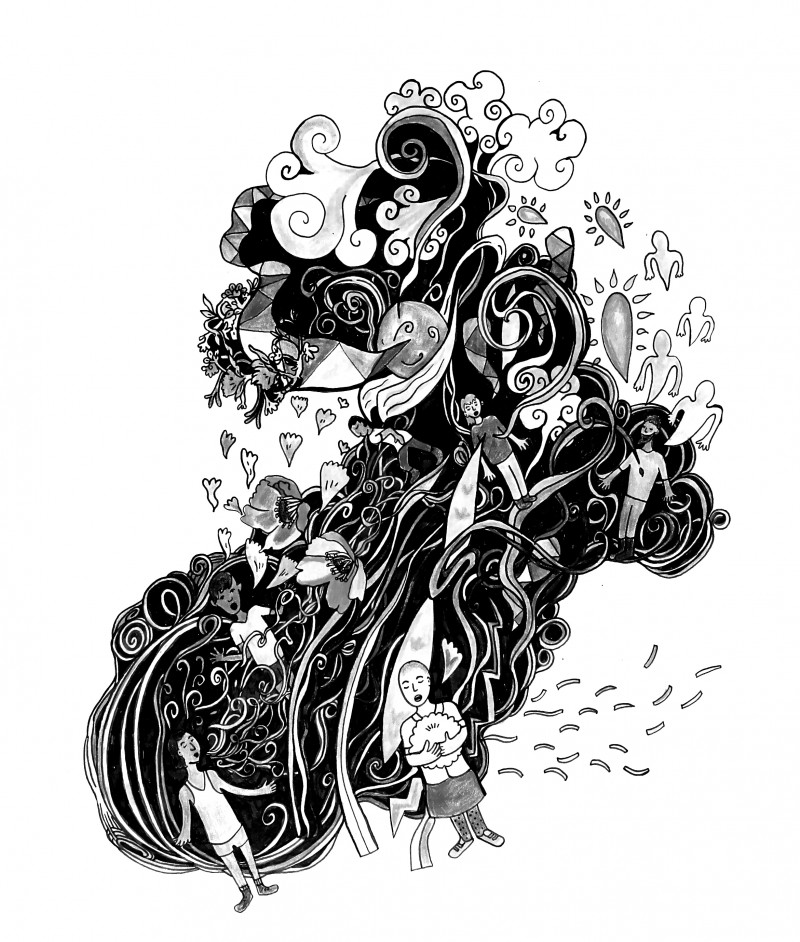EcoFaith Recovery and the Practices for Awakening Leadership

"Discover Our Stories" by Sarah Holst
“Are you a self-help group?” “Are you a church?” “Where do you worship?” We get these questions a lot! But for EcoFaith Recovery, the answers are more evolutionary and revolutionary than simply yes or no.
EcoFaith Recovery was birthed in 2009, when Robyn Hartwig began calling together friends and colleagues in Portland, Oregon, to try to make sense of our addictive culture and its escalating symptoms – the economic, social, ecological, and spiritual crises culminating in global warming and climate chaos. Gathering in those early years, we embarked on a process of discovery. Not unlike the founders of Alcoholics Anonymous, we discovered that we felt more sane just by coming together. We felt less alone. We were less despairing. And we also discovered common experiences and feelings among us that compelled us to seek a way of recovery.
Many of us found that we were not spiritually grounded and that our current faith practices were not sufficiently rooting us to weather the storms (ecological, economic, social, political, and spiritual) of climate change and cultural and ecological degradation. So we often felt overwhelmed by the incessant bad news, finding ourselves either compulsively acting to fix the problem or “checking out” emotionally. Many of us sought ways to get involved in actions or efforts of our congregations and local organizations, but often left these experiences and meetings feeling more isolated than when we came. And many of us found ourselves exhausted and burned out by the endless needs and urgent pleas of our “good causes.”
But when we came together, over and over again, we discovered something more – the truth that when we came out of isolation, in mutual vulnerability and longing for recovery from our cultural addiction, we began to see more clearly what was happening. And, more importantly, why. Seeing with unflinching eyes the enormity and complexity of the “why” led us, then, to an even deeper truth – the truth that when the addiction is larger than a family system, when its symptoms are more deadly for people with black and brown skin, and when its consequences are both cumulative and catastrophic, our recovery can not simply be as individuals. Nor can it be anonymous.
We needed new steps for a new kind of recovery.
Five years into this great experiment, we entered into a process of conscious self-reflection. We asked ourselves, “What exactly are we doing that helps us recover our sanity? That breaks us out of isolation? That grounds us spiritually? That empowers us to choose engagement rather than disengagement?” Simple practices emerged immediately – practices many of us had learned from a variety of sources, our faith traditions and community organizing primary among them. But when we began to consciously engage these practices, they deepened profoundly and became The Practices for Awakening Leadership.
Today these seven practices shape and ground us as we grow and mature in the personal, interpersonal, community, and public dimensions of our lives.

“The Practices for Awakening Leadership,” illustrations by Sarah Holst
ACCESS Spiritual Power.
Recognizing the magnitude of the crisis and its unmanageability, as well as our own God-given power and place within God’s evolving universe, we access spiritual power when we come together and as a way of life.
DEVELOP Relationships.
Recognizing the interconnectedness of all life and the power-among that arises when we engage in mutual vulnerability and authentic relationship, we resist isolation by intentionally developing relationships with others, prioritizing relationships with the land, creatures, and people whose life experience is vastly different from our own.
DISCOVER Our Stories.
Recognizing the power of knowing our own life stories and how we have been shaped by land, history, economy, culture, and other forces, we seek to discover our own stories and invite the stories of others, particularly those whose stories have been silenced. In the process of story sharing, we discover the power of God at work connecting our stories to write a new story of collective liberation and transformation.
MENTOR One Another.
Recognizing that our skills and perspectives are both unique and limited, we intentionally seek out and offer mentoring to one another, drawing out one another’s giftedness while offering our own best gifts for the mutual development of ourselves as leaders.
ACT Together.
Recognizing the important yet limited nature of individual actions, and recognizing that issues that affect us collectively must be addressed collectively, we intentionally engage in collective action.
REFLECT On Our Actions.
Recognizing that our mutual learning, growth, and maturation depends on our ability to engage in honest conversations about our individual and collective leadership, power dynamics, and the impact of our actions on others and on systems, we prioritize regular individual and collective reflection.
RESTORE Balance.
Recognizing the deadly and deadening effects of addictive patterns on personal, communal, and global levels, we support one another in restorative and life-giving practices even, and especially, as we participate in the unrelenting work of restoring justice and balance to social, economic, and ecological systems.
Like The Twelve Steps of recovery groups, The Practices for Awakening Leadership impel us toward not simply new behaviours, but a new consciousness – “a spiritual awakening” as the Twelfth Step says. Part of that new consciousness, that spiritual awakening, reveals itself in our ever-deepening awareness of our very selves as an expression of the sacred evolving universe, not separate from it. What if we ourselves are the earth’s immune system rising to meet this terrifying threat to our collective life? What if how and with whom we act together for justice matters as much as that we act together? What if “restoring balance” is more than just taking a frantic break now and then, but instead is both the end we seek and the means by which we seek it? And what if, out of this consciousness, we can no longer tolerate the separation of human social, racial, and economic justice from “environmentalism” or “creation care?”
Leaders within EcoFaith Recovery, especially those of us who are primarily white- and Christian-identified, are discovering that such a shift in consciousness is no longer an optional awakening for the enlightened few, but a necessary awakening for the ordinary many. This is our work of recovery.
This is how we:
- recover our true vocation as people of faith and citizens of Earth;
- recover our sanity in the midst of an addictive culture and economy;
- recover a right-relationship with all of creation, including human and non-human communities;
- recover the courage to rise up with the
- most vulnerable and oppressed in the face of systems that escalate injustice and climate chaos; and
- recover our prophetic imagination for the flourishing of an earth-honouring and life-honouring faith, economy, and culture.
- We are EcoFaith Recovery, and we are recovering.
Solveig Nilsen-Goodin is a Spiritual Director, Coach, wife, mother, and organizer/activist in Portland, Oregon. She coaches leaders and teams in EcoFaith Recovery’s Practices for Awakening Leadership.
EcoFaith Recovery builds its library of online resources when volunteer leaders share how they are using The Practices for Awakening Leadership in their own contexts. Resources are available at ecofaithrecovery.org.



Start the Discussion